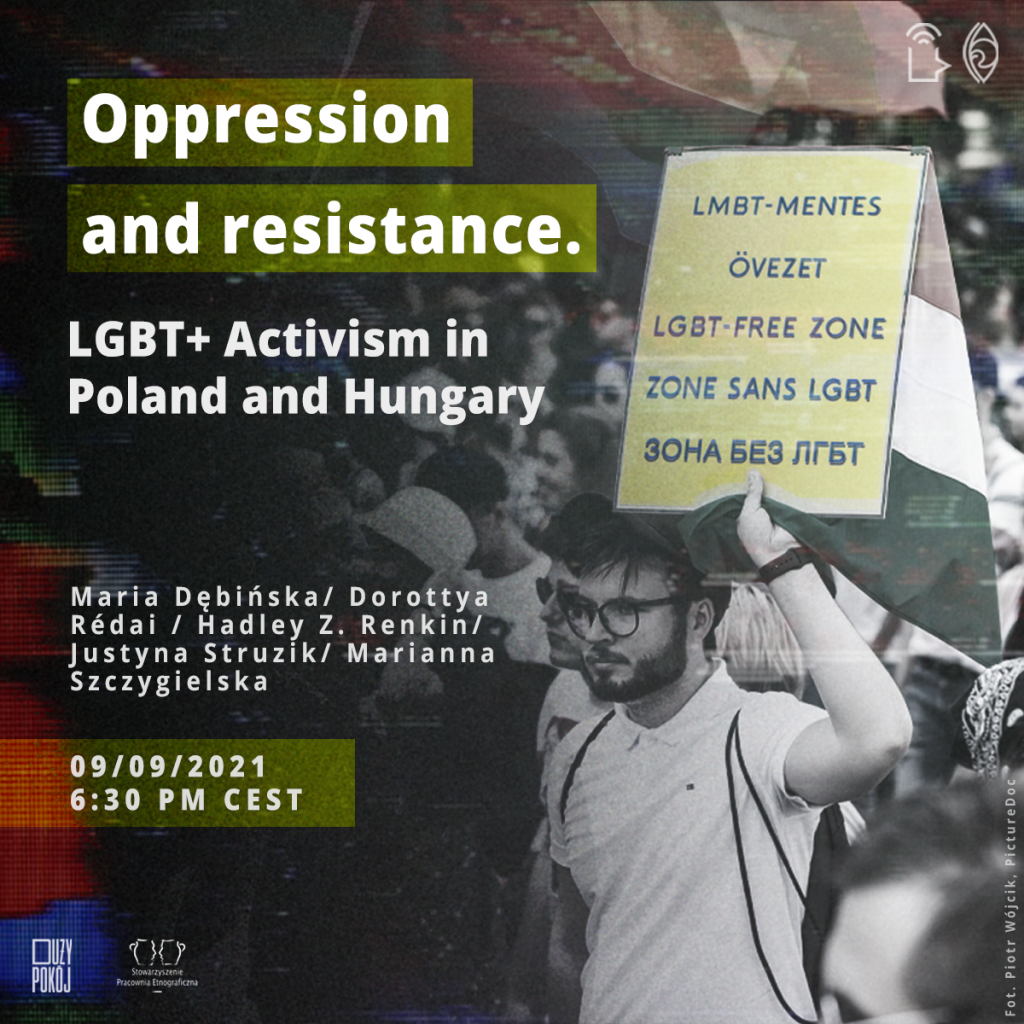Oppression and resistance. LGBT+ Activism in Poland and Hungary

In the past few years Poland and Hungary have been regularly criticised for discriminating LGBT+ people. Not earlier than in July this year the European Commission launched legal cases against Hungary’s law banning LGBT+ content for children and Poland’s „LGBT-free” zones.
We invited researchers studying the situation of LGBT+ people in both countries, who at the same time are involved in activities for the rights of minorities. During the discussion, we will compare the situation of LGBT+ people and movements in Poland and Hungary. We will ask about the legal and social background for the current situation. What changes can we observe in strategies of resistance and fight for LGBT+ rights? What can say about the attitudes of Polish and Hungarian societies towards LGBT+ people? To what extent the anti-gender backlash is transnational in nature? What kinds of solidarity can activists and researchers forge across the borders?
Our guests:
MARIA DĘBIŃSKA is Assistant Professor at the Institute of Archeology and Ethnology, Polish Academy of Sciences. She received her PhD in anthropology from the University of Warsaw (2015) for a thesis on the topic of legal, medical, and social contexts of the emergence of transgender subjectivities in Poland. In the years 2013-2014 she was a visiting researcher at the Gender Studies Department of the Central European University in Budapest funded by a Visegrad Fund Scholarship. She is Principal Investigator in the research grant funded by the Polish National Science Center “Slime mold as method: Ethnography of scientific practice” (2020-2022).
DOROTTYA RÉDAI is an independent scholar working in the field of gender, sexuality and education in Hungary. She has a PhD in gender studies from Central European University. Her research interests include gender equality in education, sex education, the intersectional reproduction of social inequalities in education, and anti-gender education politics in Central Eastern Europe. Her monograph „Exploring Sexuality in Schools. The Intersectional Reproduction of Inequality” was published in 2019 by Palgrave Macmillan. Besides her research and training work, she is an activist in Labrisz Lesbian Association, and she is the coordinator of the „Fairyland is for Everyone” book project. She received the Emma Goldman Snowball Award in 2020 for her feminist academic and activist work.
HADLEY Z. RENKIN received his PhD in Anthropology from the University of Michigan; he also has an MA in Gender Studies from CEU. His work centers on postsocialist East European sexual politics and sexuality’s implications for changing conceptions of citizenship and belonging. He is particularly interested in the regional rise of public homophobia. He has published on postsocialist homophobia and the politics of pride, Hungarian LGBT history-making, and sexual geotemporality, and is revising the manuscript for a book, ‘Disorientations: Queer Politics and Geotemporal Belonging in Hungary’s Postsocialist Conjuncture,’ an ethnographic study of the emergence of Hungary’s LGBT movement, how it has used national and transnational temporalities and geographies to assert multiple forms of belonging, and the resistance its claims have faced.
JUSTYNA STRUZIK – sociologist and social researcher affiliated with the Institute of Sociology, Jagiellonian University. She has conducted research on queer activism in Poland and the history of HIV/AIDS policies. As part of the activities of the Women’s Space Foundation, she co-led innovative research on the social situation of non-heterosexual women living outside big cities. She currently works on harm reduction and drug policies and wonders why there is almost no drug-user movement in Poland.
Discussion will be led by:
MARIANNA SZCZYGIELSKA is a gender studies scholar and a queer-feminist activist. She has authored a chapter on feminist responses to backsliding gender policies in Poland for the book Gendering Democratic Backsliding in Central and Eastern Europe. A Comparative Agenda (CEU Press, 2019). Marianna’s research focus is on environmental humanities and feminist science and technology studies. Currently, she is Postdoctoral Fellow at the Max Planck Institute for the History of Science in Berlin.
Pomóż nam tworzyć przestrzeń dyskusji na ważne tematy, wesprzyj Stowarzyszenie Pracownia Etnograficzna: https://etnograficzna.pl/wplata/!
